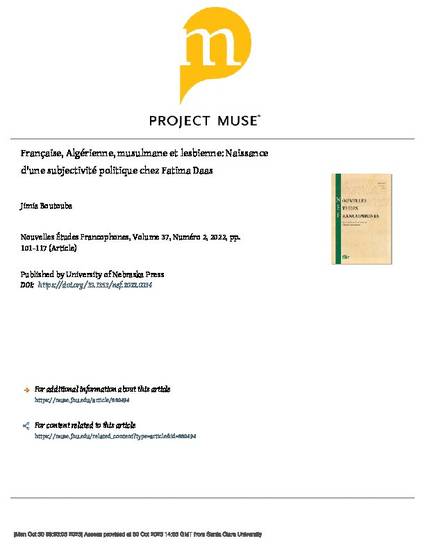
Article
Française, Algérienne, musulmane et lesbienne: Naissance d'une subjectivité politique chez Fatoma Daas
Nouvelles Etudes Francophones (NEF)
(2022)
Abstract
This article centers on the politics of “sexual nationalism” as deployed in contemporary France. In particular, it investigates the way LGBTQ rights are increasingly incorporated into French national discourses, thus establishing new boundaries of belonging as well as new exclusions. As queer theorist Jasbir Puar argues, the way same-sex sexuality is incorporated in ideas of nationhood is problematic because it is premised on the exclusion of nonnormative ethnic and religious “Others” -Muslims in particular- who are considered inimical to LGBTQ rights. Homonationalism, as defined by Puar, not only contributes to legitimize criticism of Islam and fuel Islamophobia across the nation, but it also places French Queer Muslims in a precarious position. The recent controversy generated by Fatima Daas, a young author who identifies as French, Algerian, lesbian and a practicing Muslim, testifies to the way sexual and ethno-religious identities are seen as mutually exclusive, thus constructing Queer Muslims as “a group to be saved” from their homophobic culture and religion. Refusing to be silenced by the imposition of a homonormative model of “visible” queer sexuality, Fatima Daas offers an oppositional gaze, and a counter-narrative that disentangles the complex intersections of sexuality, religion, and ethnicity.
Keywords
- Lesbian,
- Muslim. Intersectionality,
- Homonationalism,
- France,
- Islam
Disciplines
Publication Date
2022
Citation Information
Jimia Boutouba. "Française, Algérienne, musulmane et lesbienne: Naissance d'une subjectivité politique chez Fatoma Daas" Nouvelles Etudes Francophones (NEF) (2022) Available at: http://works.bepress.com/jimia-boutouba/7/
